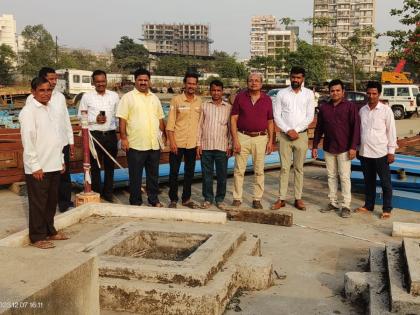NGT Slaps Rs 10,000 Fine on TTD for Delay in Responding to Environmental Concerns in Ulwe Temple Case
By Amit Srivastava | Updated: January 17, 2025 18:32 IST2025-01-17T18:32:15+5:302025-01-17T18:32:39+5:30
In a significant development in the Ulwe Balaji temple case, the National Green Tribunal (NGT) has reprimanded the Tirumala ...

NGT Raps TTD for Delay in Environmental Rejoinder, Imposes Rs 10,000 Penalty
In a significant development in the Ulwe Balaji temple case, the National Green Tribunal (NGT) has reprimanded the Tirumala Tirupati Devasthanams (TTD) counsel for the delay in responding to an application that raised environmental concerns. As a result, the NGT has imposed a penalty of Rs 10,000 on the temple body.
The case was heard by the NGT’s western zonal bench on Friday, following a petition filed by NatConnect Foundation director B N Kumar. A junior advocate representing TTD counsel, Satya Sabharwal, requested additional time to submit a rejoinder. However, the Bench, comprising Justice Dinesh Kumar Singh (judicial member) and Dr. Vijay Kulkarni (expert member), expressed frustration. They noted that the last order, dated August 30, 2024, had allowed TTD two weeks to file its rejoinder, yet it had not been submitted even after four and a half months.
Advocate Ronita Bhattacharya, representing the petitioners, informed the Bench that TTD had still not complied with the order. Justice Singh responded by stating that TTD would be allowed to file its response, but only after paying the Rs 10,000 penalty for the delay.
TTD's junior counsel sought to excuse the delay, citing a change in the government in Andhra Pradesh since the case was filed. However, the Bench rejected the explanation and set the next hearing for March 20. TTD is governed by the Andhra Pradesh government's Endowments Ministry, and its temple Board is appointed by the state.
The Bench also directed the Union Ministry of Environment, Forest and Climate Change (MOEFCC) to submit an affidavit, as Bhattacharya emphasized the importance of the Centre’s response given the serious environmental concerns raised. Additionally, the Bench instructed NatConnect’s counsel to submit rejoinders to affidavits filed by CIDCO and the Maharashtra Coastal Zone Management Authority (MCZMA).
The case stems from environmental concerns raised by Kumar, who filed a petition highlighting that the Tirupati Venkateswara Swami temple project was allotted a 40,000 square meter plot in an ecologically sensitive area, previously dominated by intertidal wetlands, mudflats, and mangroves. The plot was carved out from a temporary casting yard built for the Atal Setu, which buried the wetland and mudflats, according to Kumar's application.
In a related matter, official information obtained under the RTI Act reveals that the casting yard did not have mandatory Pollution Control Board approval before commencing work.
Meanwhile, NatConnect has alerted Andhra Pradesh Chief Minister N Chandrababu Naidu about the risks posed by rising sea levels to the Navi Mumbai temple project on the Ulwe coast, in addition to violations of environmental norms. Kumar has requested Naidu to reconsider the project and ask CIDCO for an alternative plot. "We are not opposed to the temple itself, but it could be planned in an environmentally sustainable area," the activist stated.
Kumar also highlighted that a flood hazard line runs through the temple site, as confirmed by CIDCO’s layout map. NatConnect brought to Naidu’s attention a statement from Telugu Desam Party spokesperson Neelayapalem Vijayakumar, who criticized the then-state government under Y. S. Jaganmohan Reddy in August 2023 for rushing the temple project despite environmental concerns.
At the NGT, the applicant presented Google Earth maps of the coastline, showing the presence of intertidal wetlands, mudflats, and sparse mangroves before the casting yard was established in 2019. In its affidavit, MCZMA stated that the CRZ clearance was granted based on the Coastal Zone Management Plan (CZMP) 2019, approved by MOEFCC. However, NatConnect contended that the CZMP failed to take into account the ground situation before 2019, when the area was an active fishing zone.
Open in app